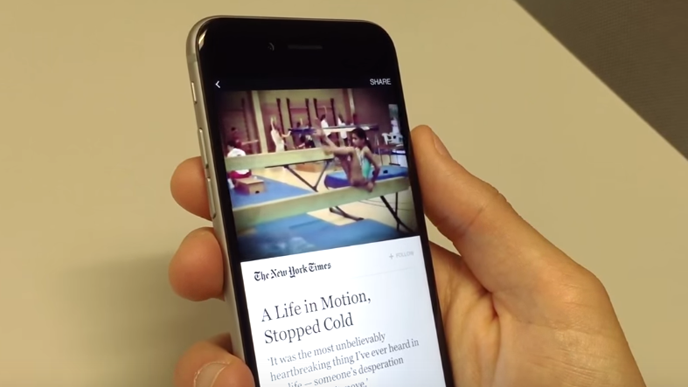As a platform, Facebook has changed and evolved significantly with the times. It may have started out as a way for college classmates to keep in touch, but it’s so much more than that now. It’s a legitimate marketing platform for companies of all types and sizes and, more recently, it is becoming a legitimate publishing platform too. We’re going far beyond the Facebook notes of old.
In 2015, Facebook announced Facebook Instant Articles, beta testing the new technology with a handful of carefully selected publishers. The platform has now been opened up to almost anyone, so as a blogger or content creator, should you care? Should you sign up? Will Facebook Instant Articles make a difference for your business?
What Are Facebook Instant Articles?
Let’s start at the beginning. In short, Facebook Instant Articles are web articles that are published directly on Facebook itself. The content can be and effectively is the same kind of content you’ll find on any number of websites and blogs around the Internet. They can be news stories, tutorials, listicles, you name it.
What’s different is that they have been optimized such that they load “instantly” for users, rather than waiting for some webpage to load. Facebook says that a regular mobile webpage can take around 8 seconds to load fully, whereas the same content published through Facebook Instant Articles will load in one-tenth of the time.

TechCrunch put together a great video explaining some of the basics of how this works. You’ll notice that I mentioned a mobile webpage. That’s because Facebook Instant Articles are not designed for desktop use at all.
So, It Only Affects Mobile?
In short, yes. It has become abundantly clear that a focus on mobile is a growing priority for all the major tech giants. Google is placing more weight on it and Facebook is certainly paying attention too.
When you click on an article on Facebook through the web browser on your computer, it will still open up as a new tab (or new window) as normal. You’ll still go to the regular publisher’s site. If that same article has been published and optimized for Facebook Instant Articles, clicking on the same link within the Facebook mobile app will open the Instant Articles version within the Facebook app. It won’t launch Chrome or Safari. It won’t even open the Facebook browser, per se, inside the app.
Why Would I Want to Use Them?
The reader experience is being prioritized here. If you optimize your content for Facebook Instant Articles, which basically pulls the content from your blog’s RSS feed, you are theoretically providing readers the best and fastest possible version of your content should they click on your link within the Facebook mobile app.
If readers like your content, they’re more likely to read more of your content. They’re more likely to subscribe to your mailing list, share your post, or buy your products. You can also tap into cool HTML5 features that Facebook Instant Articles enable, like scrollable images and zoomable videos. That’s all good and, done right, Instant Articles really do look great.
You also keep all the ad revenue that your article earns, so long as you are the one selling the ad space.
Is There a Down Side to Instant Articles?
There are at least a few reasons why you might not want to optimize your blog content for Facebook Instant Articles.
First, while you can tap into the Facebook platform to sell advertising within your Instant Articles, Facebook will take a 30% cut. This isn’t so bad and you are able to tap into an advertising marketplace that you may not otherwise have access to.
Second, you will need to put in the work to optimize all your posts for Instant Articles. Your RSS feed, for instance, must be full feed (instead of an excerpt RSS feed) and it will need to contain your last 50 posts. That’s the minimum, at least for now, for how much content Facebook wants to see before you can enable the platform. These requirements may or may not be problematic for you and your site design.
Third, and perhaps most importantly, readers who access your content via Instant Articles will not count toward your site’s traffic numbers. This is because they’re not going to your website at all; they’re staying within the confines of Facebook, which is the overriding objective for Facebook in the first place. They don’t want people to leave. Since these readers aren’t going to your site, your traffic numbers could suffer and this could affect your monetization and marketing potential.
Not Exactly an Instant Decision
You have a lot to consider before you might activate Instant Articles on your Facebook page. Readers may be provided with a better mobile experience and you could reach new audiences this way; although Facebook says its algorithm won’t necessarily prioritize Instant Articles over regular links, Instant Articles may receive more likes, comments and shares because the experience is better.
That said, there is more work to be done, you could run into optimization problems, and you will lose out on some of your regular traffic numbers. It’s not an easy decision and it’s also not one to be taken lightly.